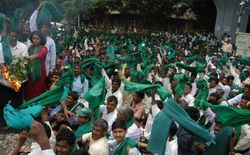TNN | 30 November 2011
BANGALORE: Consider this: A multi-national company will enter into an agreement in the upcoming Global Agri-investors' Meet with the state government to buy/lease over 2,000 hectares in Gangavati for growing paddy. The company eventually uses the world's best practices to grow high-quality basmati rice and later sells them in the foreign market at thrice the rate at which it's available in the local market.
While the government will earn a handsome royalty, farmers will get a lucrative price for their land sold or leased to investors for a period ranging from 20 to 100 years. And local labourers will obviously be happy with jobs coming to their doorstep.
Wait till you read the flipside of such investment. "If we lose our family farmers, we'll lose the diversity in our food supply, and what we eat will be dictated to us by a few large corporations. Family farms are a valuable resource worth preserving. The government should avoid providing land to private investors and encourage local farmers for rapid poverty reduction and food security in the country,'' said Chukki Nanjundaswamy, of the Karnataka Rajya Raitha Sangha (KRRS) which plans to hold a parrallel meet to educate farmers about the looming dangers of the Global Agri-business meet.
She said the most profound long-term consequence is the expansion of corporate control over food production. It would not only destroy local agriculture but also result in severe food insecurity and increased poverty,'' she added
Endorsing her views, K S Puttannaiah, leader of another faction of the KRRS, said: Karnataka in a bid to lure multinationals in the agricultural sector will convert the state from food producer to food exporter.''
According to them, small farmers are more efficient, usually making good use of their resources and are certainly more efficient than many large farmers. Most importantly, family farmers serve as responsible stewards of the land. They produce more food, they are sustainable, they are environmentally friendly, and they do not displace large numbers of farmers from the land.
BANGALORE: Consider this: A multi-national company will enter into an agreement in the upcoming Global Agri-investors' Meet with the state government to buy/lease over 2,000 hectares in Gangavati for growing paddy. The company eventually uses the world's best practices to grow high-quality basmati rice and later sells them in the foreign market at thrice the rate at which it's available in the local market.
While the government will earn a handsome royalty, farmers will get a lucrative price for their land sold or leased to investors for a period ranging from 20 to 100 years. And local labourers will obviously be happy with jobs coming to their doorstep.
Wait till you read the flipside of such investment. "If we lose our family farmers, we'll lose the diversity in our food supply, and what we eat will be dictated to us by a few large corporations. Family farms are a valuable resource worth preserving. The government should avoid providing land to private investors and encourage local farmers for rapid poverty reduction and food security in the country,'' said Chukki Nanjundaswamy, of the Karnataka Rajya Raitha Sangha (KRRS) which plans to hold a parrallel meet to educate farmers about the looming dangers of the Global Agri-business meet.
She said the most profound long-term consequence is the expansion of corporate control over food production. It would not only destroy local agriculture but also result in severe food insecurity and increased poverty,'' she added
Endorsing her views, K S Puttannaiah, leader of another faction of the KRRS, said: Karnataka in a bid to lure multinationals in the agricultural sector will convert the state from food producer to food exporter.''
According to them, small farmers are more efficient, usually making good use of their resources and are certainly more efficient than many large farmers. Most importantly, family farmers serve as responsible stewards of the land. They produce more food, they are sustainable, they are environmentally friendly, and they do not displace large numbers of farmers from the land.














